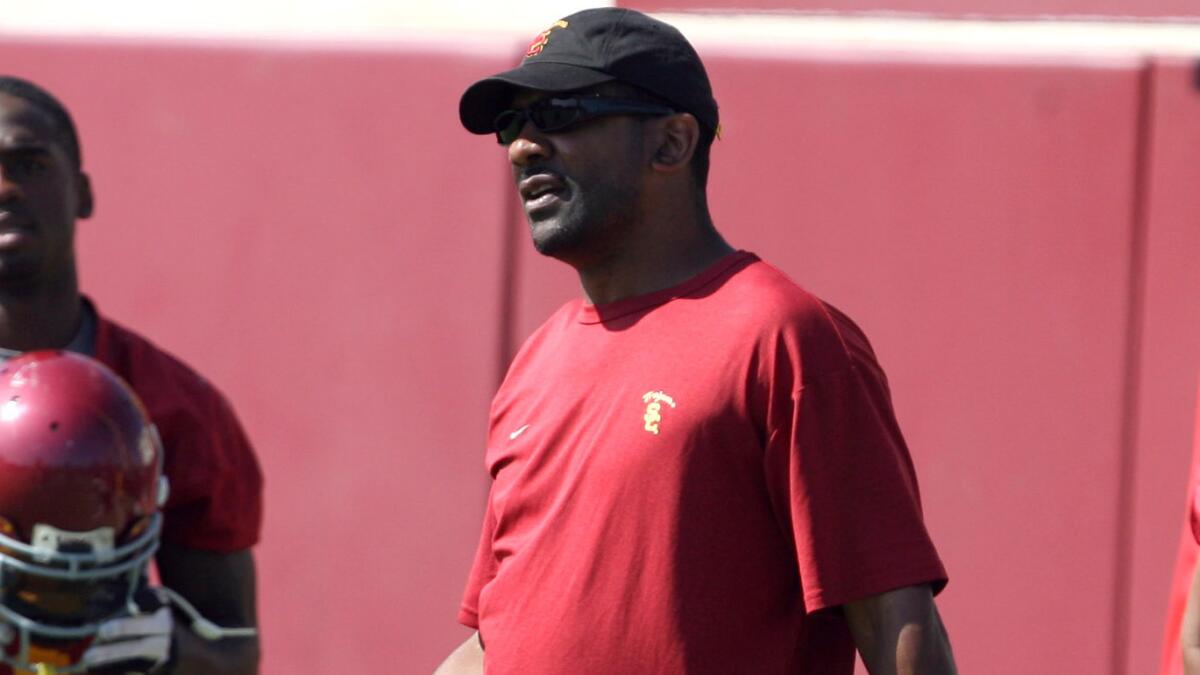NCAA: Unsealing Todd McNair documents would hurt future investigations

- Share via
Three judges peppered an NCAA attorney with questions Monday about why the organization wants to seal hundreds of pages of internal emails and other documents in former USC running backs coach Todd McNair’s defamation lawsuit against it.
Laura Wytsma told California’s 2nd Court of Appeal that making the documents public would undermine the NCAA’s ability to conduct investigations.
“We will not have the ability to provide meaningful assurances to witnesses that their statements will be confidential,” Wytsma said.
The judges, though, repeatedly challenged the argument.
“Can that be as important as the openness of the court?” Judge Patti Kitching said.
Another judge, Robert Aldrich, referred to the NCAA as “judge, jury and executioner,” though he later clarified that he didn’t intend the remark to be pejorative.
McNair sued the NCAA in 2011 after being penalized in connection with the investigation of former USC running back Reggie Bush. In denying the NCAA’s motion to dismiss the lawsuit two years ago, a Los Angeles Superior Court judge wrote that the internal emails conditionally filed under seal “tend to show ill will or hatred.
Monday’s hearing was limited to the sealing matter.
The Los Angeles Times and New York Times asked the appellate court to unseal the documents.
Thomas Burke, an attorney representing the news organizations, told the court Monday that the sealing served “only to protect the vanity of the NCAA” and said that the standard to seal is “not even close” to having been met.
One of McNair’s attorneys, Stuart Esner, professed confusion over how making the documents public would hamper future NCAA investigations.
“The issue is whether the public has the right to know the information in these court files,” Esner said.
Wytsma said the NCAA isn’t trying to obscure “wrongful conduct” but its rules don’t allow confidentiality to be breached in investigations.
“We’re not trying to hide from anything,” she said, noting that some witnesses would talk to the NCAA only if granted confidentiality.
Wytsma added: “The NCAA has been as transparent as it can be on this one.”
The judges’ focus included NCAA bylaw 32.1.1, which says that the organization’s investigations should remain confidential “until they have been announced.”
“Why should confidentiality be maintained four years later?” Aldrich said.
The judge later expressed bafflement over the rule’s wording in light of the NCAA’s arguments.
Esner and Wytsma declined comment after the hearing.
Burke said that he expects a ruling within 90 days.
In a statement Monday afternoon, NCAA chief legal officer Donald Remy said, “The NCAA respects the judicial process and remains committed to fully protecting the interests of its member institutions, student athletes, and third-parties in the confidentiality of its enforcement process, as required by its rules.”
Follow me on Twitter.
More to Read
Go beyond the scoreboard
Get the latest on L.A.'s teams in the daily Sports Report newsletter.
You may occasionally receive promotional content from the Los Angeles Times.











